
 |
||||||
|
GAY
FILM REVIEWS BY MICHAEL D. KLEMM
|
||||||
|
Born
in 68 Strand
Releasing, Directors:
Screenplay
Starring:
Unrated, 166 minutes |
Children
Of The Revolution
Born in 68, a film by Olivier Ducastel and Jacques Martineau, looks at two generations of revolutionaries. The action begins in May of 1968 when strikes and student riots exploded throughout France, almost precipitating the unpopular government's collapse. Three students, Catherine and the two men she loves, scream slogans and hide from the police as their campus falls under siege. Two decades later, one of the children from this revolution comes out as a gay man and carries on the traditions of his parents when he protests with ACT-UP. |
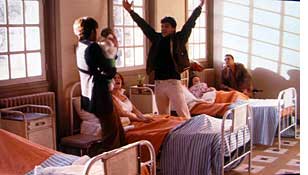 The
early scenes introduce the Marxist triangle between Catherine (Laetitia
Casta), Ives (Yannick Renier) and Herve (Yann Tregouet). They are students
at the Sorbonne, protesting a Fascist government and advocating its overthrow.
They are young, passionate, and extremely naive. Picture the cast from one
of Godard's 1960s agitprop polemics, except better looking. Disillusioned
when the strikes end (and de Gaulle is still in power), these lovable anarchists
decide to make another revolution of their own by founding a commune on
an abandoned country farm. The
early scenes introduce the Marxist triangle between Catherine (Laetitia
Casta), Ives (Yannick Renier) and Herve (Yann Tregouet). They are students
at the Sorbonne, protesting a Fascist government and advocating its overthrow.
They are young, passionate, and extremely naive. Picture the cast from one
of Godard's 1960s agitprop polemics, except better looking. Disillusioned
when the strikes end (and de Gaulle is still in power), these lovable anarchists
decide to make another revolution of their own by founding a commune on
an abandoned country farm. |
|
|
Most of the film's second half is set in the 1980s and the children have grown to adulthood. Boris (Theo Frilet), diagnosed with HIV, is angry and joins ACT-UP. His sister, Ludmilla (Sabrina Seyvecou), is too independent to remain in a traditionalist marriage to an Iranian expatriate. Both children rebel against convention while, at the same time, openly rejecting their parents' revolutionist values and notions of free love. |
|
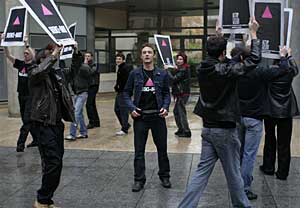 Born
in 68
features an ensemble of colorful characters set against a vast political
canvas. The cast keeps things interesting but I have to confess to being
totally lost in the film's politics. Not being from France, or a student
of its recent history, I didn't have a clue what exactly our young
anarchists were fighting for, what they later pined after - or what their
children blame them for either. Presumably, this might be obvious to French
filmgoers. Events such as the election of Mitterand, or the fall of Communism,
are referenced to establish the passage of time, and you either get the
historical references or you don't. Born
in 68
features an ensemble of colorful characters set against a vast political
canvas. The cast keeps things interesting but I have to confess to being
totally lost in the film's politics. Not being from France, or a student
of its recent history, I didn't have a clue what exactly our young
anarchists were fighting for, what they later pined after - or what their
children blame them for either. Presumably, this might be obvious to French
filmgoers. Events such as the election of Mitterand, or the fall of Communism,
are referenced to establish the passage of time, and you either get the
historical references or you don't. |
|
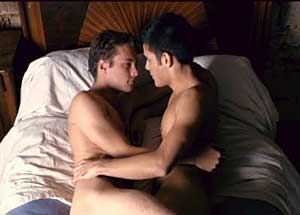 However,
despite my ignorance, I was still entertained. Born
in 68 is a terrific generational soap opera with more than
its share of drama. There isn't much tension between Ives and Herve over
Catherine's affections (in fact all three remain lifelong friends despite
living in different worlds) but there is plenty of conflict elsewhere as
the film progresses. Herve's run-ins with the authorities supply a bit of
action at the midpoint. Catherine's best friends, on a nearby farm, disapprove
of their son Christophe's sexual relationship with Boris and there is tragedy
when both boys come home from school with the news that they are HIV positive.
Boris' sister, Ludmilla, confronts her fiancee to see if he slept with her
mother when he lived for a time on the farm. Life in the city is contrasted
with the simple life that Catherine continues to live, as an aging hippie,
on the farm. However,
despite my ignorance, I was still entertained. Born
in 68 is a terrific generational soap opera with more than
its share of drama. There isn't much tension between Ives and Herve over
Catherine's affections (in fact all three remain lifelong friends despite
living in different worlds) but there is plenty of conflict elsewhere as
the film progresses. Herve's run-ins with the authorities supply a bit of
action at the midpoint. Catherine's best friends, on a nearby farm, disapprove
of their son Christophe's sexual relationship with Boris and there is tragedy
when both boys come home from school with the news that they are HIV positive.
Boris' sister, Ludmilla, confronts her fiancee to see if he slept with her
mother when he lived for a time on the farm. Life in the city is contrasted
with the simple life that Catherine continues to live, as an aging hippie,
on the farm. |
|
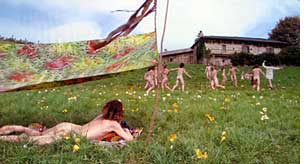 The
free love element might be Bertolucci-lite (see the famed director's 2003
The Dreamers for an explicit menage between a young woman and two
men during May, 1968) but it's still pretty sexy. The founding of the commune
seems to be the heart of the movie and the filmmakers offer idyllic photography
of naked bacchanals in the fields. Penises wag for the camera as well as
breasts. Yet despite all this "love the one you're with" mentality, we never
see two men getting it on at the commune. Of course two women do it (and
then Ives joins in). Gay sex isn't forgotten though, part two includes several
love scenes between Boris and his partners. The
free love element might be Bertolucci-lite (see the famed director's 2003
The Dreamers for an explicit menage between a young woman and two
men during May, 1968) but it's still pretty sexy. The founding of the commune
seems to be the heart of the movie and the filmmakers offer idyllic photography
of naked bacchanals in the fields. Penises wag for the camera as well as
breasts. Yet despite all this "love the one you're with" mentality, we never
see two men getting it on at the commune. Of course two women do it (and
then Ives joins in). Gay sex isn't forgotten though, part two includes several
love scenes between Boris and his partners. |
|
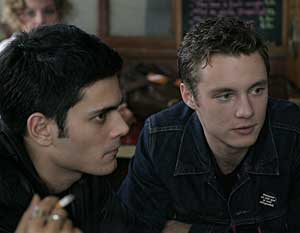 It's
hard to completely fall in love with these characters as each seems designed
primarily to represent a particular political point of view. Even so, the
cast does a nice job. The make-up that ages them is mostly convincing but
they should have all looked much older at the film's conclusion. Despite
its 166 minute length, their stories remain engaging - even if the film
would benefit from a return to the editing room. Sections could use some
trimming; a few less songs at the commune for starters. On the other hand,
the film gets choppier as it progresses and a little less shorthand regarding
the background politics would have gone a long way towards explaining the
cast's motivations. It's
hard to completely fall in love with these characters as each seems designed
primarily to represent a particular political point of view. Even so, the
cast does a nice job. The make-up that ages them is mostly convincing but
they should have all looked much older at the film's conclusion. Despite
its 166 minute length, their stories remain engaging - even if the film
would benefit from a return to the editing room. Sections could use some
trimming; a few less songs at the commune for starters. On the other hand,
the film gets choppier as it progresses and a little less shorthand regarding
the background politics would have gone a long way towards explaining the
cast's motivations. |
|
|
|